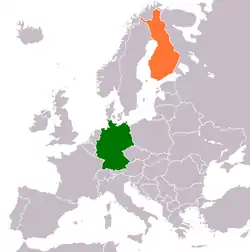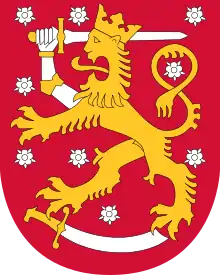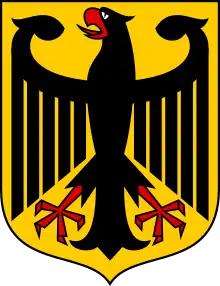Finland–Germany relations
Finland–Germany relations refers to the bilateral relations between the Finland and Germany. Both countries are part of the European Union and are signatories of the Schengen Agreement.
 | |
Germany |
Finland |
|---|---|
| Diplomatic mission | |
| Embassy of Germany, Helsinki | Embassy of Finland, Berlin |
History
Relations between both nations began after the German Empire recognised the newly independent Finnish state on January 4, 1918. In the ensuing Finnish Civil War, Germany played a prominent role siding with the White Army and training Finnish Jägers.[1] In one of the decisive battles of the war, German troops took Helsinki in April 1918.[2]
During World War II, the secret protocol in Molotov-Ribbentrop pact enabled the Winter War (1939–40), a Soviet attack on Finland. Finland and Nazi Germany were "co-belligerents" against Soviet Union during Continuation War (1941–44), but a separate peace with Soviet Union led to the Finnish-German Lapland War (1944–45).
Finland recognised both the Federal Republic of Germany and the German Democratic Republic (West and East Germany) in 1972 and it established diplomatic relations with East Germany in July 1972 and with West Germany in January 1973.[3]
Resident diplomatic missions
Finland also has a consulate general in Hamburg, two honorary consulates general in Düsseldorf and Munich and other honorary consulates in Bremen, Dresden, Frankfurt am Main, Hanover, Kiel, Lübeck, Rostock, Stuttgart and Wilhelmshaven.
_(6298294868).jpg.webp) Embassy of Finland in Berlin
Embassy of Finland in Berlin Embassy of Germany in Helsinki
Embassy of Germany in Helsinki
Country comparison
| Population | 5,585,000 | 82,066,000 |
| Area | 338,424 km2 (21,851 sq mi) | 357,021 km2 (120,726 sq mi) |
| Population Density | 18/km2 | 229/km2 |
| Capital | Helsinki | Berlin |
| Largest City | Helsinki – 621,863 (1,420,576 Metro) | Berlin – 3,510,032 (5,964,002 Metro) |
| Government | Parliamentary representative democratic republic | Federal parliamentary constitutional republic |
| Current Leader | President Sauli Niinistö Prime Minister Sanna Marin |
President Frank-Walter Steinmeier Chancellor Angela Merkel |
| Official languages | Finnish and Swedish | German |
References
- John Horne, ed. (2011). A Companion to World War I. John Wiley & Sons. p. 561. ISBN 9781118275801.
- "Apr 13, 1918: Germans capture Helsinki, Finland". History.com. Archived from the original on 21 May 2013. Retrieved 30 November 2012.
- Leatherman, Janie (2003). From Cold War to Democratic Peace: Third Parties, Peaceful Change, and the OSCE. Syracuse University Press. pp. 97–102. ISBN 9780815630326.

